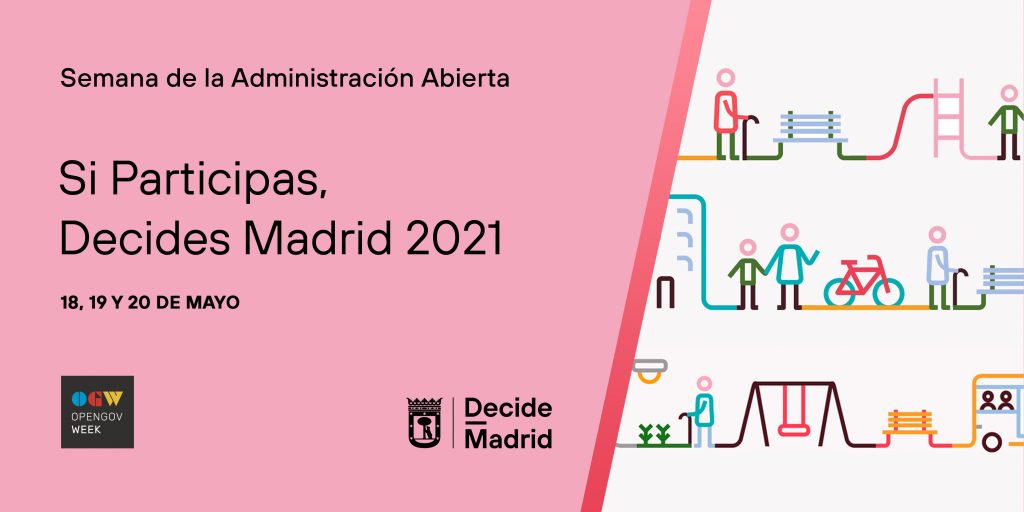19 May 2021
for Madrid Nuevo Norte

Distrito Castellana Norte takes part in the “If you participate, you decide Madrid 2021” Conference, as part of the Open Administration Week.
The director of Social Engagement, Gema del Pozo, outlines the strategy of citizen participation that has been carried out to involve all residents in Madrid Nuevo Norte.
There are currently more than one hundred groups participating in the activities being carried out with the citizens of Madrid.

The Director of Social Engagement of Distrito Castellana Norte (DCN), Gema del Pozo, today participated in the “If you participate, you decide Madrid 2021” Conference, organised by the Madrid City Council as part of the Open Administration Week, with the aim of publicising the policies and programmes of citizen participation and transparency of the City Council with the citizens. The conference, organised by the Directorate General for Citizen Participation of the Madrid City Council, is part of the OpenGovWeek initiative promoted worldwide by the Open Government Alliance.
Del Pozo took part in the round table “Citizen participation for territorial rebalancing: working neighbourhood by neighbourhood”, with the participation of the representative of the San Martin de Porres Foundation, Maria Elena Gil; the president of the Regional Federation of Neighbourhood Associations of Madrid (FRAVM), Vicente Pérez; the doctor of architecture of the Royal College of Art, Almudena Cano; and the general coordinator of Territorial Coordination, Transparency and Citizen Participation of Madrid City Council, Sara Aranda.
All of the participants presented the specific initiatives that they are carrying out, each one from their own area, to promote citizen participation, to involve people in the issues of their neighbourhoods, and also to provide solutions to specific problems at the local level.
In this context, the DCN’s head of Social Engagement explained “the importance of participatory and inclusive processes from the private initiative in Madrid Nuevo Norte, a project that has successfully reached a historical political and social consensus.” Madrid Nuevo Norte aims to close the gap that the train tracks have created in the north, which is not only physical, but also economic and social, she explained. For this reason, from the very start, DCN has understood that it was essential to involve the citizens of the existing neighbourhoods in the new project. “Madrid Nuevo Norte has to be integrated into the pre-existing city and to do this, we have worked with the administrations from the beginning,” she said.
Del Pozo recounted the difficulties she encountered when the Social Engagement area approached the neighbourhoods to open a dialogue with citizens. The minimal culture of participation and the lack of habit of the citizens to get involved in an ongoing and permanent way meant that in the early phases of work in the neighbourhoods, the vast majority of the activities had to be aimed at generating engagement to make the neighbours aware and to establish contact. Only after this process was it possible to start carrying out activities specifically focused on making the project known, analysing it and getting to know the opinions of the residents, their demands and suggestions.
The DCN representative recalled that this work of informing residents was essential to counteract the large amount of fake news and biased information that was circulating about the project, due to the many accumulated years of delay. In turn, the opinions, demands and suggestions of the residents have been communicated throughout the process to the technicians of the Madrid City Council, responsible for planning Madrid Nuevo Norte.
The need for citizen participation does not end with planning, but rather will continue to be necessary throughout the life of the project. In the current phase of urban management, for example, DCN’s Social Engagement has a large number of projects underway that involve not only the residents of the northern neighbourhoods, but all of the citizens of Madrid. These include, for example, the Jobs Project, which, in collaboration with the District Councils, aims to facilitate access to the hundreds of thousands of jobs that will be generated by Madrid Nuevo Norte. Or the Transition Spaces project to create areas to be enjoyed and used by citizens on land in Madrid Nuevo Norte while the project is under construction.
“Our goal is to generate social benefits for Madrid’s neighbourhoods, addressing their needs and challenges, as well as extending the values of the project and integrating all citizens, making Madrid Nuevo Norte into a social added value for the city and contributing to achieving the SDGs and the European Urban Agenda 2030”, summarised Del Pozo.